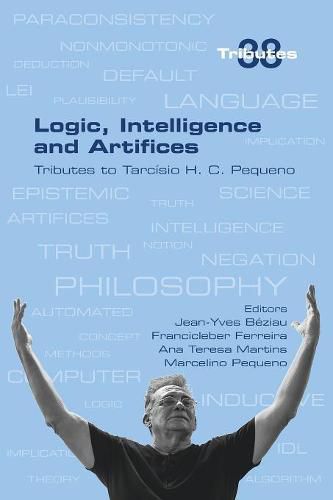Readings Newsletter
Become a Readings Member to make your shopping experience even easier.
Sign in or sign up for free!
You’re not far away from qualifying for FREE standard shipping within Australia
You’ve qualified for FREE standard shipping within Australia
The cart is loading…






This title is printed to order. This book may have been self-published. If so, we cannot guarantee the quality of the content. In the main most books will have gone through the editing process however some may not. We therefore suggest that you be aware of this before ordering this book. If in doubt check either the author or publisher’s details as we are unable to accept any returns unless they are faulty. Please contact us if you have any questions.
This volume is a homage to the computer scientist and philosopher
Tarc sio Haroldo Cavalcante Pequeno. Tarc sio dedicated his research
to subjects ranging from logic to philosophy through artificial
intelligence, theoretical computer science and language. His main
contributions were in nonmonotonic and paraconsistent logics,
especially the study of negation; algebraic approaches to the semantics
of programming languages, applications of intuitions from game
semantics to automatic theorem proving; tableaux methods for
paraconsistent logics and the role of rule following and rule
consciousness in cognition, motivated by his interest in philosophy
and the problem of demarcation of rationality.
The contributions to this volume reflect the broad range of interests characteristic of
Tarc sio’s scientific interests. Topics include relations between
logic and category theory, specifications of model checkers,
philosophy of paraconsistent logics, epistemic logic, abstract
argumentation semantics, natural language processing, foundations of
mathematics, philosophical aspects of natural language processing,
philosophy of logic and language, metaphysics, philosophy of science.
During the last forty years, Tarc sio oriented, inspired and
collaborated with many researchers and established the field of logic
as an active research area in Northeast Brazil. This book expresses
the admiration of his colleagues and the recognition of his influence
on their academic lives.
$9.00 standard shipping within Australia
FREE standard shipping within Australia for orders over $100.00
Express & International shipping calculated at checkout
This title is printed to order. This book may have been self-published. If so, we cannot guarantee the quality of the content. In the main most books will have gone through the editing process however some may not. We therefore suggest that you be aware of this before ordering this book. If in doubt check either the author or publisher’s details as we are unable to accept any returns unless they are faulty. Please contact us if you have any questions.
This volume is a homage to the computer scientist and philosopher
Tarc sio Haroldo Cavalcante Pequeno. Tarc sio dedicated his research
to subjects ranging from logic to philosophy through artificial
intelligence, theoretical computer science and language. His main
contributions were in nonmonotonic and paraconsistent logics,
especially the study of negation; algebraic approaches to the semantics
of programming languages, applications of intuitions from game
semantics to automatic theorem proving; tableaux methods for
paraconsistent logics and the role of rule following and rule
consciousness in cognition, motivated by his interest in philosophy
and the problem of demarcation of rationality.
The contributions to this volume reflect the broad range of interests characteristic of
Tarc sio’s scientific interests. Topics include relations between
logic and category theory, specifications of model checkers,
philosophy of paraconsistent logics, epistemic logic, abstract
argumentation semantics, natural language processing, foundations of
mathematics, philosophical aspects of natural language processing,
philosophy of logic and language, metaphysics, philosophy of science.
During the last forty years, Tarc sio oriented, inspired and
collaborated with many researchers and established the field of logic
as an active research area in Northeast Brazil. This book expresses
the admiration of his colleagues and the recognition of his influence
on their academic lives.